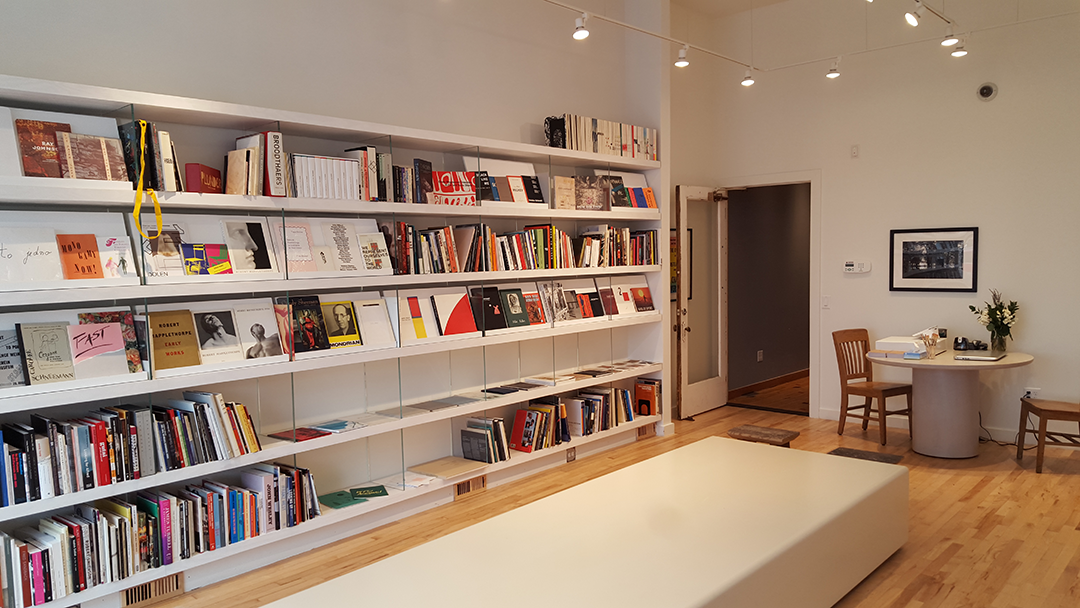As he rummages through a slew of cardboard boxes in the cramped basement of Bing, a new bookstore in Washington Park, curator Hamza Walker’s excitement is tangible. “Check this out,” he says, turning to manager Chris Salmon, “it’s Bauhaus, the band!” He and his colleague proceed to flip through the seminal post-punk group’s pamphlet, surrounded by boxes of similarly rare and highly valuable knick-knacks.
Flanked by empty retail spaces and whitewashed storefronts, Bing sits quietly across from the Garfield Green Line station, easily overshadowed by the trains that rumble overhead. Part bookstore, part reading room, artist and University of Chicago professor Theaster Gates’ newest venture resembles a saloon from the outside. Its catchy name is spelled out in a vaguely Western font, lit up with a bright white neon that flickers invitingly. But despite its humble appearance, Bing has the honor of being the only bookstore on the South Side to exclusively sell art books, and its mission is more community-based than it is commercial.
While most of the pieces Walker and Salmon sift through will end up in Gates’ own galleries rather than at the new bookstore, the pair’s fascination with rare art books demonstrates that the Bing project is about a lot more than just making money.
“Conceptually, [the store] was supposed to be a reading library—an active library that people participate in,” says Salmon, who worked for twelve years at Powell’s Books in Hyde Park.
The store’s warm interior manages to be cozy despite its modernist aesthetic. Its well-lit display room is punctuated by a place for visitors to read and examine the objects around them, a low table that doubles as a seating area and fits the library function Salmon describes. The left-hand side of the room is adorned with books and pamphlets of all shapes and sizes. Artists from Roy Lichtenstein to Yoko Ono are represented on these shelves, and every item is more intriguing than the last.
The opposite side of the display room has a slightly different character, and although the items are of a similar nature, they are tucked away in various drawers designed to be pulled out and examined. And there is plenty to examine—every drawer contains something eye-catching, like a pamphlet depicting abstract art built around war medals from fascist Italy or photographs of Muhammad Ali in Zurich from 1971.
A door at the back of the display room opens into the store’s as-of-yet unopened wine bar, and an adjacent staircase leads to a sparsely furnished corridor that ends in a red-brick screening room. Bing has been hosting week-long film screening series there every month (something Salmon calls “passive programming”), showing films borrowed from another Gates endeavor, the Black Cinema House. During other events, passersby can walk in at any time and experience the downstairs space at their leisure.
The layout of the space, as unconventional as it may be, is meant to allow guests to access Bing’s collection of art books, one that is without parallel on the South Side.
The vast majority of the books at Bing come from either Walker’s collections or from Powell’s Books, and while every item is technically for sale, many of them are not priced for the average consumer. The rare Parkett periodical, for example, is listed at $3,500. Salmon, however, says that selling books at Bing is more of a financial necessity than a focus.
“We’re not going to make a killing on this,” he says. “That’s not the idea. But we’d like to cover what it costs to run it, if nothing else.”
The high cost of some of the books at Bing has led some to express concern about the potential for such stores to drive gentrification in the area. The bookstore is located along a stretch of East Garfield Boulevard that already includes the UofC’s Arts Incubator and Currency Exchange Café, both projects of Gates, who has said that he dreams of converting this section of Garfield into an arts and culture district.
But Salmon says that rather than focus on the prices of the books, local residents should see Bing as a resource for people of all backgrounds to visit and enjoy.
“If you can sum up the goal here in one sentence, it’s just to get people in the door and exposed to—and interested in—things they would not normally be exposed to,” he says. “The idea is that this is a communal space. People can access these books if they can’t afford to buy them. The stuff is for sale, but we’re happy to have people come in and simply experience them as well.”
The bookstore’s wine bar is still waiting on a liquor license and its organizers still have many ideas in the works. Regardless of its profitability, however, the people behind Bing seem deeply connected to its idiosyncratic collection of art books, pamphlets, and other ephemera. For them, providing the public with access to such a collection has become a passion in its own right.
Bing, 307 East Garfield Blvd. Tuesday–Saturday, 12pm–7pm. bingartbooks.com

